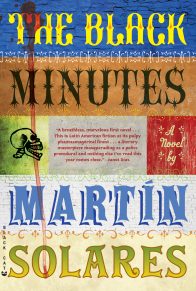“Rich in conception and execution . . . Don’t Send Flowers is full of odd twists and strange surprises.”—Wall Street Journal
“A gripping crime story set amid Mexico’s escalating drug cartel wars and a nationwide atmosphere of police and judicial corruption . . . [Don’t Send Flowers] is an excellent, frightening portrayal of the breadth and depth of Mexico’s cartel violence and systemic corruption.”—Publishers Weekly
“This gritty noir by Solares combines a compelling mystery with political upheaval and will appeal to fans of fast-paced thrillers in grim locales.”—Library Journal
“Any noir fan will feel at home with this novel immediately; gritty and vicious but so real it’s scary. . . The writing is cool, even lyrical, the dialogue is a hard-boiled joy. . . Don’t Send Flowers is a labyrinthine tale of corruption, gang wars, revenge and murder . . . A no-nonsense full-on thriller that leaves you breathless. . . Don’t Send Flowers brings a town under siege from narco-traficantes, corrupt officials and greedy businessmen to life. . . Solares doesn’t pull his punches, these are the meanest of streets. A pacy, sharp witted thriller that will stay with you for a long time.”—Nudge Book Magazine
“Crime novels don’t get much grittier . . . Solares keeps the pace high, the pages turning. A sort of Mexico Confidential, with noirish atmosphere to burn and a very high body count.”—Kirkus Reviews
“A gritty, direct, exciting novel that is a must-read for anyone who wants to look at the hell that the Gulf (and Mexico at the same time) has become.”—Antonio Ortuño
Praise for The Black Minutes
“A breathless marvelous first novel… Latin American fiction at its pulpy phantasmagorical finest, this is a literary masterpiece masquerading as a police procedural and nothing else I’ve read this year comes close. Solares does for Latin American literature what Eduardo Lago did for Iberian literature with his monumental novel Llámame Brooklyn. The Black Minutes is that good.”—Junot Díaz, in The Times Literary Supplement
“Mr. Solares is a graceful, even poetic, writer, especially in his hard-boiled dialogue and his descriptions of the wildly varied landscapes and ethnic types of northern Mexico. Though the world of The Black Minutes is one to inspire fear and revulsion, Mr. Solares’s descriptions of it are oddly beautiful and fascinating in the same way that overturning a rock and observing the maggots beneath can be a perversely edifying spectacle.” —Larry Rohter, The New York Times
“Solares’s debut deftly treads a risky tightrope between police procedural and surreal fantasy . . . this haunting novel forces readers to confront that bedeviling paradox of human nature, the eternal mystery of wickedness.”— Publishers Weekly (starred review)
“From its first pages, it’s clear that Martín Solares’s debut crime novel is shooting for more than basic genre thrills. The writing is clean, almost edgeless, but the occasional elegant metaphor slips in. Most of the writing, however, steers clear of overt gestures, for a good reason: At 436 pages, this double-tiered mystery has more than enough incident to get through as is . . . The Black Minutes is briskly immersive and satisfyingly tangled, with a resonant sense of the weight of age-old injustices.” —The Onion
“Martín Solares’s first novel, The Black Minutes, an uncommonly nuanced neo-noir… may be exactly the right book to read at the end of 2010, a particularly dark year in recent Mexican history. It’s crime fiction, but it’s also a meditation on corruption, and it captures the kind of nightmarish helplessness that many feel in the face of the tide of narco-violence sweeping the north of Mexico… Scraping away some of the cool remove of the traditional noir, The Black Minutes gives a gorgeous, suffocating sense of life in Mexico’s sweltering northeast and an equally smother sense of a justice system in which the concept of justice has been leached of meaning… The general impact of the plot is stunning. His characters simultaneously move toward resolution and the void, each success paradoxically dragging them down.” —The Nation
“Martín Solares uses the codes and formula of classic crime novels to create a universe where the reader is permanently on a fluctuating border between dream and reality, between fiction and the authentic violence of facts.”— Le Monde (France)
“At first, the sheer exuberant inventiveness of this remarkable Mexican debut may mystify some American crime-fiction fans. If those readers give it a chance, however, they may wonder why the authors they usually read are so risk-averse . . . Solares’ prose—alternately playful, poetic, and plainspoken—propels the pages. Some fantastic elements of Latin American fiction, such as dreams and ghosts, are present, but they won’t be dealbreakers for crime fans who don’t like magical realism.” —Booklist
“Martín Solares’s first novel is a dense, warm, and complex noir fiction. But its originality lies elsewhere, in its dreamlike digressions . . . The confessions of a Jesuit, the brief appearance of a criminology vedette, literary references, all contribute to introducing shifts to the register generating interest and charm.” —Le Temps (France)
“[Martín Solares’s] debut novel is risky business . . . One of the most ambitious crime novels that Mexico has had to offer since the great works of Paco Ignacio Taibo II.”— Titel Magazin (Germany)
“Martín Solares’s novel is intense and exhilarating, full of violence and action . . . This first novel by Solares will satisfy—and believe me, to an immense degree—those who enjoy impossible missions and quixotic adventures. Go, go read this splendid novel.”— El País (Spain)
“A dark novel, completely enclosing itself inside the parameters of the genre, in which the author shows us an extremely critical glimpse of the police corruption of his country . . . Solares displays an impressive string of situations, and constructs an action-packed plot that never declines . . . [He] is a true novelist.” —El Mundo (Spain)
“The exotic world that boils in The Black Minutes is not limited to the rules of the ordinary; the nightmare and the supernatural at times involve the narration and fracture our trust . . . detective novels that are important are those that are capable of transcending the genre, they survive by their metaphysical implications or for the sharp representation of society that inspires them.” —ABC de las Artes y Las Letras (Spain)
















